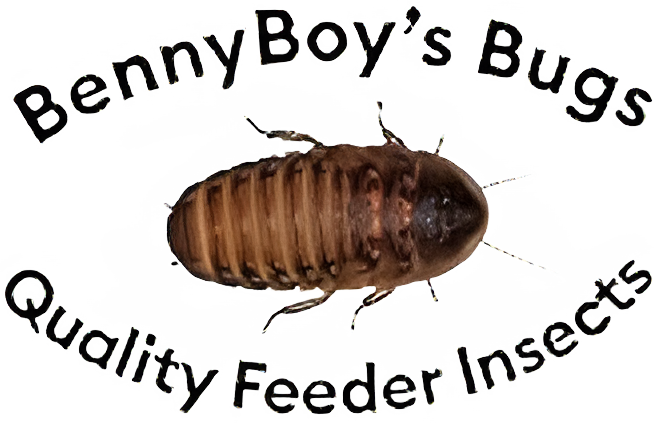Why Feed Dubia Roaches? The Healthiest Feeder Insects for Reptiles, Amphibians & Birds
If you're wondering “What is a Dubia roach?” or debating between Dubia roaches vs crickets, this guide is for you.
At Benny Boys Bugs, we believe education leads to better pet care, and knowing why you're feeding something is just as important as the act of feeding itself.
So let’s break it down.
What Is a Dubia Roach?
The Dubia roach (Blaptica dubia) is a tropical cockroach species native to Central and South America. Unlike the pests most people imagine, these roaches:
- Don’t fly or jump
- Don’t infest homes
- Are
clean, quiet, and odor-free
- Thrive in warm, dry environments
- Are
nutrient-dense feeder insects for reptiles, amphibians, and birds
At Benny Boys Bugs, our Dubias are
ethically raised, gut-loaded, and sorted by size — from tiny nymphs to full-grown feeders — for easy and safe feeding.
Dubia Roaches Nutrition: Why They're the Best
When it comes to feeder insects, nutritional value matters. Poorly fed bugs = poorly fed pets.
Here’s how
Dubia roaches stack up nutritionally:
| Nutrient | Dubia Roaches | Crickets |
|---|---|---|
| Protein | 34–36% | 18–21% |
| Fat | 6–9% | 5–7% |
| Calcium:Phosphorus | Ideal (1:2 or better) | Poor (1:9 or worse) |
| Chitin (exoskeleton) | Low – easy to digest | High – harder to digest |
| Odor | None | Strong, ammonia-like |
| Noise | Silent | Chirps constantly |
| Escape Risk | Non-climbing, non-jumping | Jumpers and climbers |
Why Dubia Roaches Win
- Higher protein and better calcium for
growth and bone health
- Softer bodies = safer for
young or recovering reptiles
- Stay alive longer, store better, and
won’t stink up your home
- Gut-loaded = full of
usable nutrients, not just calories
Why Feed Dubia Roaches Instead of Other Insects?
Crickets, mealworms, and superworms are common — but they all come with issues:
- Crickets: noisy, smelly, die easily, poor Ca:P ratio
- Mealworms: high in fat, tough exoskeletons, can cause impaction
- Superworms: very fatty, aggressive biters, not ideal for daily feeding
Dubia roaches offer the best of all worlds: clean, meaty, affordable, and easy to store. They’re the gold standard for staple feeders, especially for animals that need daily or high-volume insect feeding.
Who Should Eat Dubia Roaches?
Dubia roaches are a top feeder choice for:
- Bearded dragons
- Leopard & crested geckos
- Frogs, toads, salamanders
- Tarantulas and inverts
- Chickens & ducks
- Pet parrots and softbills
- Turtles, skinks, and monitors
- Insectivorous snakes
Whether you have a single pet or a full-scale breeding program, Dubias offer the nutrient density and safety you need.
Dubia Cockroach Care – Low-Maintenance and Long-Lasting
Keeping Dubia roaches at home is incredibly easy — even in bulk.
How to Store:
- Smooth-sided plastic bin (to prevent climbing)
- Cardboard or egg crate for shelter
- Dry environment with good ventilation
- Temps between
75–90°F for activity and longevity
What to Feed Them:
- Carrots, sweet potatoes, apples
- Dry roach chow or whole grains
- No citrus, onion, or overly moist foods
With proper care, Dubias can live for weeks — giving you a
steady, reliable feeder supply that won’t crash between shipments.
Ready to Switch to a Better Feeder?
If you’ve been dealing with chirping, smelly crickets or bland, half-dead worms — it’s time for a change. Our clean, gut-loaded Dubia roaches are raised in a temperature-controlled facility, sorted by hand, and shipped with care.
Whether you need
50 for a single beardie or
1000 for a breeding colony, Benny Boys Bugs has the
sizes, quantities, and consistency you need — backed by our
Live Arrival Guarantee.
